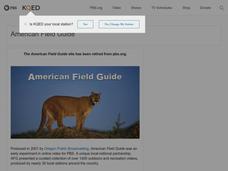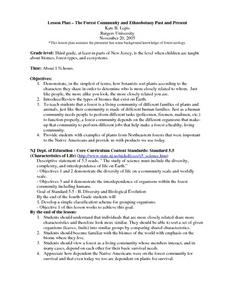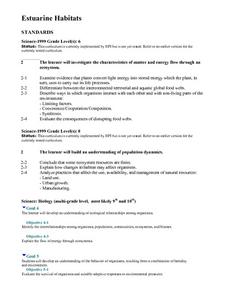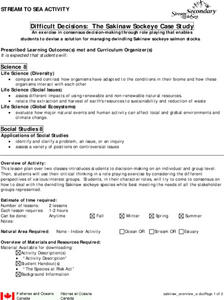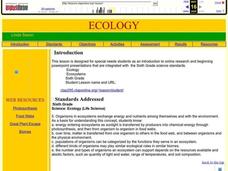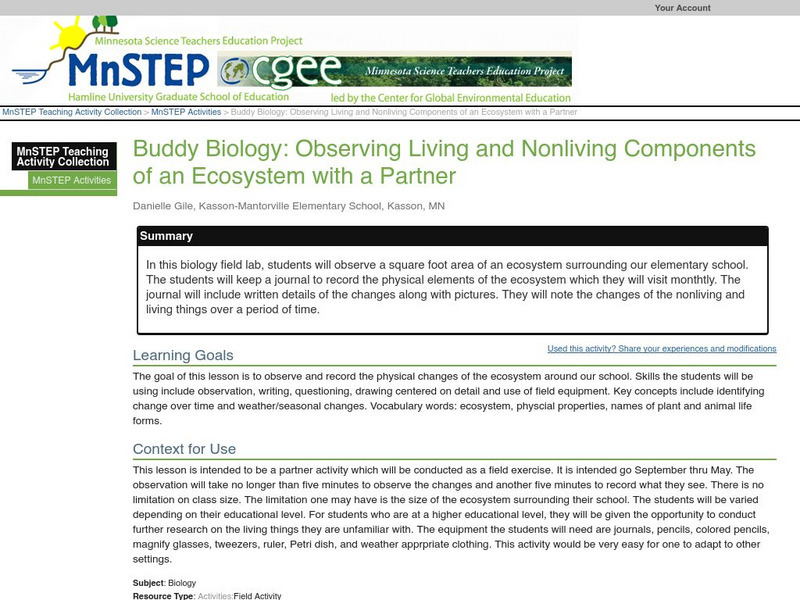Curated OER
The Formation and Value of Temperate Grasslands
Students get an overview of the climate and organisms of the North American Prairie. After a lecture, and watching some videos imbedded in this plan, students compile research data on the North American Prairie.
Curated OER
The Forest Community And Ethnobotany Past And Present
Students describe a forest as a living community. They determine members interact, and in many cases, depend on each other for their basic survival needs. They investigate how dependent the Native Americans were on the forest...
Curated OER
The Tropical Rain Forest
Students use various web sites to access information about the rain forest. They use the Tropical Rainforest Interactive CD to make their own rain forest pictures and stories and learn facts about the rain forest. They use various books...
Creative Educator
Design a Rainforest Postcard
Send your class on an expedition through the rainforest! Along the way, they will write informational postcards to demonstrate what they've learned. Each team will be responsible for one of five rainforest regions. When they return from...
Curated OER
Alphabetical Autobiography PowerPoint
Sixth graders produce an autobiography, They complete a PowerPoint including one graphic image on each slide, and a subtle or moderate animation. They include 26 slides for each letter of the alphabet, use note pages to present...
Curated OER
Estuarine Habitats
Sixth graders study the important habitats, flora, fauna, and physical factors of coastal habitats. They compare the aquatic habitats to terrestrial habitats by researching and completing tables with the information.
Curated OER
Find the Speed of a Protist
Students identify protists under a microscope, and using a stopwatch calculate the speed of a protist from a pond water sample. They use distance and time to identify the speed of a protist, and create a distance versus time graph to...
Curated OER
Structure of Earth
Seventh graders study and make a model of the significant formations of the ocean floor. They examine images and illustration and apply their imagination while creating the model. They are challenged to complete further research as an...
Curated OER
Difficult Decisions: The Sakinaw Sockeye Case Study
Eighth graders examine Sakinaw Sockeye as species at risk, participate in role playing exercise to consider different perspectives of various interest groups, and try to come to consensus on how to deal with dwindling Sakinaw sockeye...
Curated OER
Patterns and Adaptations in Plants and Animals
Fourth graders conduct research about some of the regions of Texas. They compare plants and animals to identify different adaptations. The statistics of survival rates are measured for changes.
Curated OER
Ecology
Sixth graders are introduced to online research and beginning PowerPoint presentations that are integrated. They pass a plant and photosynthesis. Students locate information on a self selected animal online. They give a PowerPoint...
Curated OER
Six Levels of Ecological Organization
Ninth graders describe the six levels of ecological organizations and give examples of each. They also differentiate between food chains and webs and identify trophic and consumer levels in food chain and food webs.
Curated OER
Commonalities and Differences from Africa to Cleveland as Evidence Through the Gullah Community Connection
Students explore Afro-American history. They identify the commonality between African, Carolinian and Cleveland Black culture. Students explore the water cycle, oceanography, hydrology and bio-geochemical processes. They discuss the...
Curated OER
HyperStudio Animal Project
Fourth graders create a HyperStudio project on an animal of their choice. They discuss the animal's habitat and adaptations. They also identify any interesting facts about their animal.
Curated OER
Art of Biodiversity
Young scholars familiarize themselves with values of biodiversity. They comprehend that biodiversity has inspirational and cultural values. Students locate five works of art on Zoo grounds that represent biodiversity in some way.
University of Illinois
University of Illinois Extension: Natural Resources, Environment, and Ecosystems
A collection of lesson plans for specific age levels to help students gain a better understanding of animals, plants, and people, and how they affect each other in ecosystems. Many of the activities provide discussion questions and...
Alabama Learning Exchange
Alex: Biomes: Where Are the Wild Things?
During this lesson, young scholars will explore biomes, ecosystems, and habitats by navigating the Internet. They will research biomes, ecosystems, and habitats in order to create a newsletter. They will have the opportunity to...
Alabama Learning Exchange
Alex: At Home in a Biome
This lesson allows students to study and learn the names and characteristics of Earth's six major biomes. The biomes are introduced with a slideshow presentation. A paper-folding poster activity gives students the opportunity to...
Alabama Learning Exchange
Alex: Our Trip Around the Biomes
During this lesson, students travel to the biomes by way of the Internet. They learn the characteristics of biomes, including animals, plants, temperatures, etc. Students then use this information to create a slideshow presentation to...
Science Education Resource Center at Carleton College
Serc: Observing Living and Nonliving Components of an Ecosystem With a Partner
In this biology field lab, students will observe a square foot area of an ecosystem surrounding our elementary school. The students will keep a journal to record the physical elements of the ecosystem which they will visit monthtly. The...
Science Education Resource Center at Carleton College
Serc: Observing Living and Non Living Components of an Ecosystem With a Partner
In this activity students will observe a square foot of an ecosystem surrounding our elementary school. They will keep a journal to record the physical elements of their area. It will include both written details and drawings. They will...
Utah Education Network
Uen: Animals in the Ecosystems
Write about animal contributions to their environment.
Cynthia J. O'Hora
Mrs. O's House: Dude, You Gotta Move: Biomes
Local headlines announce that everyone must move due to contaminated soil. Check out the one catch before students discover what is already known about biomes and what still needs to be understood about them to complete this classroom...
Other
My Science Box: Ecosystem Organization
In this instructional activity, students will learn about the different levels in the hierarchy of ecology and explain the relationships: organism, population, community, ecosystem, biome, and biosphere. They will also discover why...
